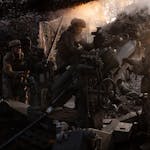IRBIL, Iraq – Iraqi forces backed by Iranian-trained militias and U.S. airstrikes have made significant progress in isolating Ramadi, the capital of Anbar Province that the Islamic State in Iraq and the Levant overran in May, according to Iraqi officials, local residents and Western military advisers.
But it is uncertain whether the city will soon be retaken. Iraqi officials repeatedly have expressed optimism about progress against ISIL, only to be unable to defeat the extremists, especially in areas such as Ramadi where Sunni Muslims are in the majority and have little trust in the Shiite-led government in Baghdad.
"We have now cut the last supply line of Daesh connecting Ramadi to Syria," said an Iraqi officer who works in the Anbar command center but lacks authorization to speak publicly. "Iraqi forces can now strangle the terrorists inside the city and we should see victory in a few days."
Daesh is an Arabic term for ISIL.
A Western military adviser to Iraq's autonomous Kurdish Regional Government who has been briefed on the situation by his country's trainers working to rebuild the Iraqi military agreed that the progress to isolate Ramadi was a legitimate achievement. But he cautioned that much harder work is to come as Iraqi military units face fighting in a city of nearly 1 million people that remains populated. Kurdish forces are not participating in the operation.
"Iraqi forces have struggled in urban operations, and Ramadi will be tough once they enter the city itself," he said on the condition of anonymity. He said the Iraqi government's success in recapturing Tikrit in the spring was unlikely to prove precedent for the push to take Ramadi.
"They were only able to take control of an empty and much smaller Tikrit due to heavy coalition air support, which is far less feasible because Daesh didn't allow much of Ramadi to flee when they took control," he said, referring to Iraqi government forces. "House-to-house fighting is hard for well-trained armies, and Iraq does not have anything resembling that."
The operation to encircle Ramadi began Wednesday. According to U.S. Central Command, at least seven airstrikes a day have targeted the area, primarily the outskirts of the city in an effort to deny ISIL fighters the ability to maneuver.
On Thursday, Iraqi officials said airstrikes had destroyed five large ISIL tactical units, allowing the seizure of a bridge to the west of the city that was the last link to other ISIL-held areas.
U.S. and Iraqi officials have been divided over whether retaking Ramadi should have the priority. U.S. officials have publicly pushed for the Iraqi army to focus on the other major city in Anbar, Fallujah, because it has been mostly abandoned and is on the road linking Ramadi to Baghdad. But Iraqi officials have said that as a point of pride they want to retake the provincial capital first, which would isolate Fallujah and make it much easier to retake.
Iraqi Prime Minister Hadi al Abadi has been critical of the U.S. reluctance to conduct heavy airstrikes in populated areas, and has repeatedly implied that the disagreement over whether to focus on Ramadi or Fallujah has delayed the operation.
But the Iraqi officer at the Anbar operations center admitted the situation is complicated. Recapturing Ramadi would be difficult, given ISIL's penchant for sowing the areas it holds with thousands of improvised explosive devices and other defenses, he said.
"They have turned Ramadi into a giant bomb since May," he said of ISIL. "The number of IEDs, suicide bombers and mines makes progress very slow for our soldiers. Some days they can only move 50 meters because they have to destroy 10 bombs set by Daesh in that space."




